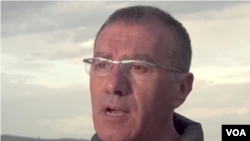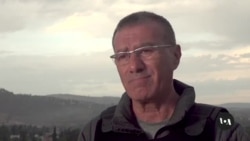Shlomi Eldar has a rare specialization for an Israeli media personality: for over 30 years, he’s been covering Hamas and Gaza.
In his books and award-winning documentaries, Eldar has tried to tell the stories of the Palestinians beyond the wall. He still grapples with the shock of the Oct. 7 attack, no longer seeing them as a group that can be reasoned with.
After the Oct. 7 attack, he said he got a phone call from a Palestinian who told him of family members killed in an Israeli strike in Gaza. Eldar admits all he could say was, “Look what Hamas did.”
Since 1991, as a reporter, book author and documentarist, Eldar brought to audiences in Israel and beyond, stories of the Palestinians in Gaza — putting a human face on repeated cycles of the conflict and revealing painful situations.
His 2010 movie “Precious Life” was about the struggle to save a Palestinian baby with a rare genetic disease. The baby was treated by Israeli doctors with the help of an Israeli donor whose son was killed by Palestinians.
In 2009, Palestinian doctor Izzeldin Abuelaish was on the phone with Eldar during a live broadcast when the doctor discovered his daughters and a niece were killed in an Israeli tank strike.
Over the years, Eldar also interviewed Hamas leaders, including Ismail Haniyeh who resides in Qatar.
Yet, Eldar said the Oct. 7 attack by Hamas, which killed over 1,200 people in Israel, left him in deep shock, as it did much of the rest of the country, especially after he saw the bodycam footage of the attackers.
“I followed Hamas for over 30 years. I've never imagined to myself they become monsters,” he said, adding that he never previously compared any of the group’s behavior to the Nazis and the Holocaust. But Eldar said seeing images of burned bodies from the Oct. 7 attacks was not something he could shake off.
“Butchering, burning bodies, children, rapes, kidnappings. They kidnapped a baby, nine months old, to Gaza,” he said.
He said Hamas was elected in 2006, in part in response to the perceived corruption of the Palestinian Authority, as well as Hamas' welfare work with the people in the Gaza Strip. He said Hamas has since neglected its responsibilities to the people, instead diverting resources from civilians and opting for violence.
Eldar said the attack cost Hamas a lot of support in Gaza.
“People in Gaza know what Hamas brings them — to the future of Gaza. They took them 20 or 25 years back — even more. I heard voices in Gaza now, talking freely, [look] 'what you've made for us. What you've done to us, they said.’ They are hiding in the tunnels,” he saidHe thinks the exceptional cruelty of the Oct. 7 attack was made possible because of a combination of several factors — one of them is Yahya Sinwar, the Hamas leader in Gaza. Sinwar was released in a 2011 prisoner exchange for the kidnapped Israeli soldier Gilad Shalit.
“He is a cruel man. I've heard many, many stories,” Eldar said. “He was arrested in 1989 because he butchered Palestinians. He suspected they were collaborating with Israel, and he just tortured them and killed them."
The second factor, which was easy for Israel to neglect beyond the wall separating Gaza and Israel, Eldar said, is the education of children in Gaza toward violence.
“The new generation, the young people — they were born, or they were children when Hamas took power in the Gaza Strip. Maybe they were children, five, six, 10 years old and they grew up with incitement all the time. And they've been taught that the Israelis are not human beings. When they invaded Israel, they didn't see the Israelis as human beings, just something that they can kill,” Eldar said.
He explained the connection between the different groups attacking Israel in the north and south is Iran and its call for jihad against Israel.
“Hamas, Islamic Jihad and Hezbollah are affiliated to Iran. Iran gave them an order to fight Israel. We have three main groups — Hamas, Hezbollah, Islamic Jihad and other smaller organizations like the Houthis in Yemen. And we can see the fingerprints of the Iranians.”
Israel has declared “the end of Hamas” as the main goal of the military campaign in Gaza. Eldar is skeptical about that.
“We can defeat Hamas. But we can't eliminate them. I think that Hamas is an ideological movement. An ideological movement you can't destroy. We can defeat the militant group,” he said, reminding that Hamas' top leaders are not in Gaza, but in Qatar. “Qatar is hiding Ismail Haniyeh and Khaled Mashal. They can rebuild Hamas again.”
Eldar is also pessimistic about the possible solutions for after the war, pointing to the lack of political alternatives, and the cost of Prime Minister Benjamin Netanyahu’s government strategy of weakening the Palestinian Authority.
“The Israelis didn't know about it [the attack] because Netanyahu preferred to divide between the West Bank and the Gaza Strip, demonizing [Palestinian Authority President Mahmoud] Abbas for years,” Eldar argues. “So, in the end, we were surprised when we saw that Hamas was not what we thought. We thought that we could contain Hamas. We failed.”
He said the recovery of Gaza may take decades — and he is not sure if the border with Israel will ever reopen.







